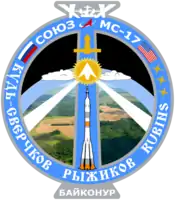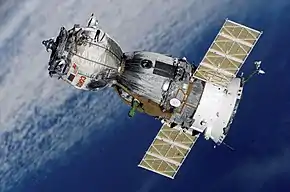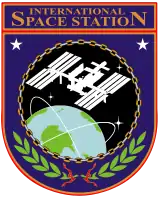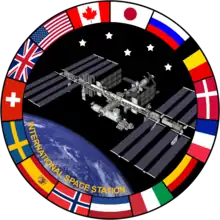Soyuz MS-17
Soyuz MS-17 is a Soyuz spaceflight that was launched on 14 October 2020.[3][8] It transported three crew members of the Expedition 63/64 crew to the International Space Station. Soyuz MS-17 is the 145th crewed flight of a Soyuz spacecraft. The crew consists of a Russian commander and a Russian and American flight engineer.[9][10][11]
.jpg.webp) Soyuz MS-17 during launch | |
| Mission type | Crewed mission to ISS |
|---|---|
| Operator | Roscosmos |
| COSPAR ID | 2020-072A |
| SATCAT no. | 46613 |
| Mission duration | 113 days and 18 minutes (in progress) 185 days (planned) |
| Spacecraft properties | |
| Spacecraft | Soyuz MS |
| Spacecraft type | Soyuz MS 11F747 |
| Manufacturer | Energia |
| Crew | |
| Crew size | 3 |
| Members | |
| Callsign | Favor |
| Start of mission | |
| Launch date | 14 October 2020, 05:45:04 UTC [1][2][3][4] |
| Rocket | Soyuz-2.1a |
| Launch site | Baikonur, Site 31 |
| Contractor | Progress Rocket Space Centre |
| End of mission | |
| Landing date | 17 April 2021 (planned) |
| Landing site | Kazakh Steppe (planned) |
| Orbital parameters | |
| Reference system | Geocentric orbit |
| Regime | Low Earth orbit |
| Inclination | 51.66° |
| Docking with ISS | |
| Docking port | Rassvet nadir |
| Docking date | 14 October 2020, 08:48:47 UTC [5][6] |
| Undocking date | 10 March 2021 (planned)[7] |
| Time docked | 112 days, 21 hours and 14 minutes |
| Docking with ISS (Relocation) | |
| Docking port | Poisk zenith |
| Docking date | 10 March 2021 (planned) |
| Undocking date | 16 April 2021 (planned)[7] |
| Time docked | 37 days (planned) |
 Soyuz MS-17 mission patch .jpg.webp) Rubins, Ryzhikov, and Kud-Sverchkov Soyuz programme (Crewed missions) | |
The mission marked the first use of a new "ultrafast" two-orbit rendezvous flight plan with the Soyuz, which saw Soyuz MS-17 arrive at the ISS within approximately three hours after the launch.[2][12][13][6]
Towards the end of the flight, the spacecraft will relocate from Rassvet to Poisk to make way for the arrival and docking of the Soyuz MS-18 spacecraft, currently set to launch on 1 April 2021 carrying cosmonauts Oleg Novitsky, Pyotr Dubrov and Andrei Borisenko to the ISS ahead of a six-month stay. The two spacecraft will have a nine-day handover period before Soyuz MS-17 departs. This is necessary to avoid de-crewing the Russian Segment (ROS) of the ISS since no Russian cosmonaut will be present aboard SpaceX Crew-1.[8] After this launch, the current schedules are unclear on whether any American astronaut will be aboard on later Soyuz launches.[14]
Crew
| Position | Crew member | |
|---|---|---|
| Commander | Expedition 63/64 Second spaceflight | |
| Flight Engineer 1 | Expedition 63/64 First spaceflight | |
| Flight Engineer 2 | Expedition 63/64 Second spaceflight | |
Backup crew
| Position | Crew member | |
|---|---|---|
| Commander | ||
| Flight Engineer 1 | ||
| Flight Engineer 2 | ||
Reserve crew
| Position | Crew member | |
|---|---|---|
| Commander | ||
| Flight Engineer 1 | ||
Crew notes
Early planning had listed Russian cosmonaut Nikolai Chub as the mission's Flight Engineer 2, pending a NASA decision on whether they would purchase more seats on the Soyuz. In May 2020, NASA purchased a Soyuz seat and assigned NASA astronaut Kathleen Rubins to the Flight Engineer 2 position, backed up by astronaut Mark T. Vande Hei.[15][18]
Originally Russian cosmonauts Anatoli Ivanishin and Ivan Vagner were set to fly as Commander and Flight Engineer 1 respectively. In February 2020, however, the two cosmonauts were moved to the Soyuz MS-16 flight due to medical issues with the commander of Soyuz MS-16, Nikolai Tikhonov. Ivanishin and Vagner were replaced by Ryzhikov and Kud-Sverchkov. Babkin may fly on Soyuz MS-18, but Tikhonov has retired from Roscosmos' astronaut corps.
Reacting to the COVID-19 pandemic, Roscosmos implemented a two-cosmonaut reserve crew to ensure the flight could go on with no delays, in the unlikely event both the prime and backup crews fall ill. It was not confirmed whether NASA planned to add an astronaut of their own to the reserve crew.[19]
Gallery
References
- Clark, Stephen (14 October 2020). "Live coverage: Soyuz crew begins flight to International Space Station". Spaceflight Now. Retrieved 14 October 2020.
- Zak, Anatoly (13 October 2020). "Soyuz MS-17 to lift off with fresh ISS crew". RussianSpaceWeb. Retrieved 13 October 2020.
- "NASA Astronaut Kate Rubins, Crewmates to Discuss Upcoming Spaceflight". M20-074 (Press release). NASA. 25 June 2020. Retrieved 4 September 2020.
 This article incorporates text from this source, which is in the public domain.
This article incorporates text from this source, which is in the public domain. - "Источник: НАСА хочет купить еще одно место в российском "Союзе"" [Source: NASA wants to buy another Soyuz seat] (in Russian). RIA Novosti. 22 October 2019. Retrieved 23 October 2019.
- Becker, Joachim (14 October 2020). "Soyuz MS-17". Space Facts. Retrieved 14 October 2020.
- Harwood, William (14 October 2020). "Soyuz crew docks with International Space Station". Spaceflight Now. Retrieved 14 October 2020.
- Zak, Anatoly (1 December 2020). "Evolution of the Soyuz MS-17 flight program". RussianSpaceWeb. Retrieved 3 December 2020.
- Zak, Anatoly (1 January 2020). "Russian space program in 2020: Soyuz MS-17". RussianSpaceWeb. Retrieved 4 September 2020.
- Becker, Joachim (11 June 2020). "Expedition 64 Report". SpaceFacts. Retrieved 12 October 2020.
- Baylor, Michael (1 April 2020). "Status - Soyuz MS-17". Next Spaceflight. Retrieved 14 October 2020.
- Harwood, William (13 October 2020). "NASA uses final purchased Soyuz seat for Wednesday flight to station". Spaceflight Now.
- Clark, Stephen (12 October 2020). "Russian rocket for next space station crew transferred to launch pad". Spaceflight Now.
- "Грузовой корабль "Прогресс" полетит к МКС по сверхбыстрой схеме" [The Progress cargo vehicle will fly to the ISS according to a superfast scheme] (in Russian). РИА Новости. 20 March 2020. Retrieved 11 June 2020.
- Grush, Loren (13 October 2020). "NASA astronaut launches on Russian rocket as United States transitions to private spacecraft". The Verge. Retrieved 13 October 2020.
- "Роскосмос подтвердил подписание контракта на доставку астронавта NASA на корабле "Союз"" [Roscosmos has confirmed the signing of a contract for the delivery of a NASA astronaut on the Soyuz spacecraft] (in Russian). ТАSS. Retrieved 11 June 2020.
- @anik1982space (9 May 2020). "Вот и новые составы российских экипажей «Союза МС-17» стали известны из пресс-релиза аэропорта Жуковский.
Основной: Сергей Рыжиков, Сергей Кудь-Сверчков.
Дублирующий: Олег Новицкий, Пётр Дубров.
К сожалению, Николая Тихонова и Андрея Бабкина нет..." [So the new compositions of the Russian crews of the Soyuz MS-17 became known from the press release of the Zhukovsky airport. Primary: Sergey Ryzhikov, Sergey Kud-Sverchkov. Dubbing: Oleg Novitsky, Pyotr Dubrov. Unfortunately, Nikolai Tikhonov and Andrey Babkin are gone.] (Tweet) (in Russian) – via Twitter. - "Flight crew assignments". forum.nasaspaceflight.com. Retrieved 11 June 2020.
- "NASA Assigns Astronaut Kate Rubins to Expedition 63/64 Space Station Crew". M20-060 (Press release). NASA. 3 June 2020. Retrieved 5 June 2020.
 This article incorporates text from this source, which is in the public domain.
This article incorporates text from this source, which is in the public domain. - "Новости. Утвержден экипаж корабля "Союз МС-17"" [The crew of the Soyuz MS-17 spacecraft was approved]. roscosmos.ru (Press release) (in Russian). Roscosmos. Retrieved 11 June 2020.
.jpg.webp)
.jpg.webp)
.jpg.webp)


